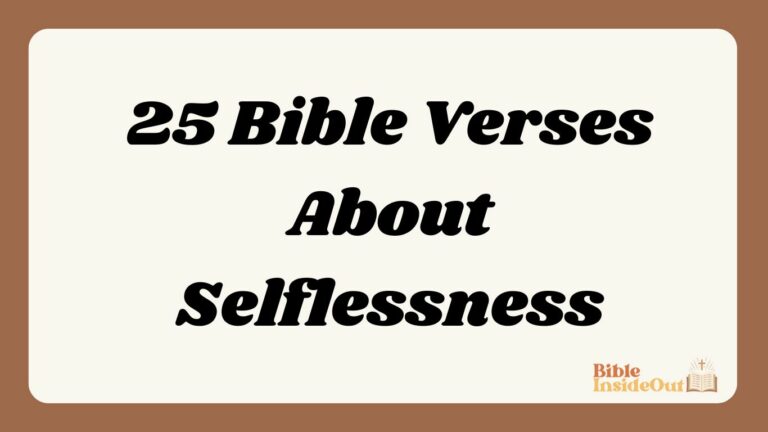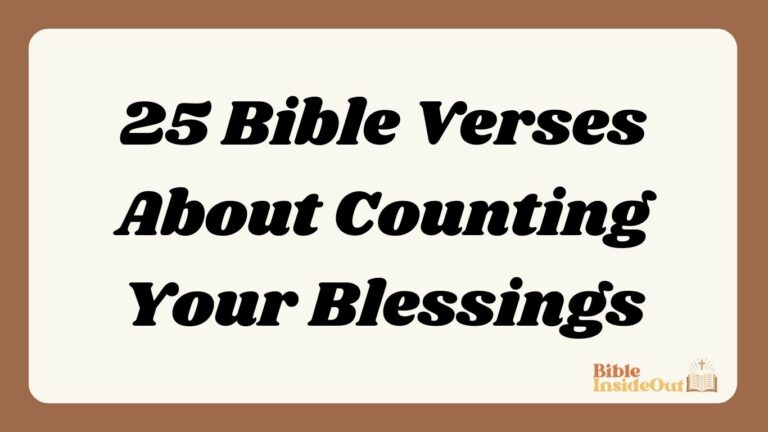25 Bible Verses About Provision (With Commentary)
Navigating life’s stormy seas, you’ve likely sought the lighthouse of provision, searching for assurance that your needs won’t just vanish with the tide.
The Bible, rich in wisdom and guidance, offers numerous verses about God’s provision, from the daily bread to the strength required to face life’s trials.
Whether you’re standing on a mountain top or finding your way through a valley, understanding how these scriptures apply to your life can be both comforting and empowering.
As you explore the layers of meaning behind verses that speak of God as both shepherd and provider, you’ll uncover insights that can transform your perspective on provision in times of abundance and need.
Let’s embark on this journey together, discovering how these timeless truths can impact your life today and in the days to come.
God’s Provision of Daily Needs

You’ll find that Scripture meticulously outlines God’s commitment to meeting your daily necessities, as evidenced by passages such as Matthew 6:31-33 and Philippians 4:19.
These verses not only assure provision but also prioritize spiritual over material needs, suggesting a divine hierarchy of sustenance.
An analysis of Psalm 34:10, Luke 12:24, and Matthew 7:11 further reveals a consistent biblical promise: those who seek the Lord lack no good thing, emphasizing an underlying principle of trust and dependence on divine provision.
Matthew 6:31-33
"So do not worry, saying, 'What shall we eat?' or 'What shall we drink?' or 'What shall we wear?' For the pagans run after all these things, and your heavenly Father knows that you need them. But seek first his kingdom and his righteousness, and all these things will be given to you as well."
In Matthew 6:31-33, Jesus explicitly instructs His followers not to worry about their daily needs, emphasizing God’s commitment to provide for those who prioritize His kingdom and righteousness.
This passage serves as a cornerstone for anxiety management, urging a shift from worldly worries to a heavenly focus.
Philippians 4:19
"And my God will meet all your needs according to the riches of his glory in Christ Jesus."
Building on the foundation of trust established in Matthew 6:31-33, Philippians 4:19 offers further assurance that God will meet all your needs according to the riches of his glory in Christ Jesus.
This verse underscores Divine richness and Unlimited resources, highlighting Faithful stewardship’s role in accessing Spiritual abundance.
It’s a testament to Graceful provision, inviting you into a deeper intimacy with the divine.
Psalm 34:10
"The lions may grow weak and hungry, but those who seek the Lord lack no good thing."
Delving into Psalm 34:10 reveals how it articulates the promise that those who seek the Lord lack no good thing, showcasing God’s unwavering commitment to providing for daily needs.
Lion imagery, evoking strength yet vulnerability, underscores this truth. Even young lions may suffer want, urging you to fear not.
Instead, seek refuge in the divine, and you’ll taste the goodness promised to those who pursue sanctuary in Him.
Luke 12:24
"Consider the ravens: They do not sow or reap, they have no storeroom or barn; yet God feeds them. And how much more valuable you are than birds!"
Reflecting on Psalm 34:10’s assurance of God’s provision, Luke 12:24 further illuminates the depth of divine care by highlighting how even the birds, without storehouses or barns, are fed by God. This verse urges you to recognize the greater provision made for your life. Feathered care symbolizes divine attention, and avian lessons teach creation’s sustenance. This offers a potent survival assurance, intimately connecting you to God’s nurturing presence.
Matthew 7:11
"If you, then, though you are evil, know how to give good gifts to your children, how much more will your Father in heaven give good things to those who ask him!"
In Matthew 7:11, we’re reminded of the profound extent of God’s generosity. The verse reassures us that if earthly parents know how to give good gifts to their children, how much more will our Father in heaven provide for our daily needs.
This passage invites us to approach God with heartfelt prayer and unwavering faith in His divine generosity. It encourages us to come to Him with an open heart, ready to receive spiritual gifts. In doing so, we embody the essence of parental love, reflecting the love and care that God has for us as His children.
Trusting God for Provision

In exploring the theme of trusting God for provision, you encounter a spectrum of biblical insights that underscore this spiritual principle.
Scriptures such as Proverbs 3:5-6 and Psalm 37:25 articulate a clear expectation for believers to rely not on their understanding but on God’s unfailing provision.
This analysis illuminates how trust in divine providence is both a command and a comfort, as seen through verses like Hebrews 13:5 and 2 Corinthians 9:8, which promise sufficiency in all things through faith.
Proverbs 3:5-6
"Trust in the Lord with all your heart and lean not on your own understanding; in all your ways submit to him, and he will make your paths straight."
Proverbs 3:5-6 calls you to place your trust in God wholeheartedly, promising His guidance in every aspect of your life as you navigate the complexities of provision.
This passage underscores the importance of trust reliance, urging a shift from self to spiritual understanding.
Heart leaning on divine navigation fosters a deeper connection, assuring path revelation that aligns with God’s will, illuminating steps toward provision.
Psalm 37:25
"I was young and now I am old, yet I have never seen the righteous forsaken or their children begging bread."
Reflecting on Psalm 37:25, one discovers a profound testament to God’s unwavering commitment to provide for those who trust Him throughout their lives. David’s confidence in this verse echoes ancient faithfulness, highlighting a generational blessing.
This scripture reassures us of righteous sustenance and unseen provision, underscoring the depth of a relationship built on trust. It’s a scholarly reminder of the divine promise of provision.
Hebrews 13:5
"Keep your lives free from the love of money and be content with what you have, because God has said, 'Never will I leave you; never will I forsake you.'"
Building on the foundation of trust highlighted in Psalm 37:25, Hebrews 13:5 further explores the theme of divine provision. It emphasizes the importance of contentment and faith in God’s steadfast presence in our lives. The passage urges you towards contentment principles, financial stewardship, and material detachment. These principles foster a generosity mindset and faithful living. By embracing these principles, you deepen your intimacy with God through a life unburdened by material excess.
2 Corinthians 9:8
"And God is able to bless you abundantly, so that in all things at all times, having all that you need, you will abound in every good work."
In Corinthians 9:8, we find a powerful assurance that God is capable of making all grace abound toward you, ensuring that you always have all sufficiency in all things and may abound to every good work.
This verse intimately links grace abound with generous giving, signifying a cycle of abundant blessing.
It speaks to spiritual riches fostering harvest readiness, underscoring a divine provision that transcends mere material wealth.
Psalm 111:5
"He provides food for those who fear him; he remembers his covenant forever."
Moving from the assurance of abundant grace in 2 Corinthians 9:8, we turn our attention to Psalm 111:5, which offers a distinct perspective on trusting God for provision, emphasizing the reliability of Divine sustenance.
This passage underscores Heavenly generosity, highlighting how divine sustenance isn’t merely material but extends to spiritual nourishment, encapsulating faithful stewardship and the eternal promise of God’s provision.
The Lord as Shepherd and Provider

You’ll find that scriptures such as Psalm 23:1 and John 10:9-10 metaphorically depict the Lord as both a shepherd and provider, illustrating a profound relationship between God and His followers.
This imagery reinforces the notion of divine provision and guidance, a theme echoed throughout biblical texts like Psalm 78:24-25 and Ezekiel 34:15.
Psalm 23:1
"The Lord is my shepherd, I lack nothing."
Psalm 23:1 vividly portrays the Lord as both shepherd and provider, emphasizing a personal and nurturing relationship with believers.
Through the metaphor of Shepherd’s care, it invites you into a space of Green pastures and Quiet waters, symbolizing sustenance and tranquility.
This passage reassures you of Fearless paths under divine guidance, leading to Restful peace, a testament to God’s unwavering provision and protection.
John 10:9-10
"I am the gate; whoever enters through me will be saved. They will come in and go out, and find pasture. The thief comes only to steal and kill and destroy; I have come that they may have life, and have it to the full."
Building on the concept of divine shepherding introduced in Psalm 23:1, John 10:9-10 further explores this theme by portraying Jesus as the gatekeeper who offers not only safety but abundant life to His flock.
Through this passage, you’re invited to understand the Shepherd’s gate as more than a symbol of security assurance; it’s a spiritual entry point promising eternal access to an abundant life, intertwining spiritual and eternal dimensions.
Psalm 78:24-25
"He rained down manna for the people to eat, he gave them the grain of heaven. Human beings ate the bread of angels; he sent them all the food they could eat."
Delving into Psalm 78:24-25 reveals how the Lord not only shepherds His people but also generously provides for them, embodying the dual roles of protector and provider.
This scripture highlights the heavenly manna as a form of angelic provision, offering both physical sustenance in the wilderness and spiritual nourishment.
It’s a profound example of miraculous feeding that underscores God’s intimate care and provision for His followers.
Psalm 81:10
"I am the Lord your God, who brought you up out of Egypt. Open wide your mouth and I will fill it."
In Psalm 81:10, the divine voice emphatically declares, ‘I am the Lord your God, who brought you up out of Egypt,’ inviting reflection on His role as both shepherd and provider for His people.
This divine command, ‘open your mouth wide, and I’ll fill it,’ serves as a covenant reminder, addressing Israel’s journey and spiritual hunger. It underscores God’s commitment to meet their needs, both physical and spiritual.
Ezekiel 34:15
"I myself will tend my sheep and have them lie down, declares the Sovereign Lord."
Ezekiel 34:15 reinforces the imagery of the Lord as a shepherd, explicitly promising, ‘I myself will tend my sheep and have them lie down,’ highlighting a direct, providential care that encompasses both leadership and sustenance.
This verse symbolizes the epitome of shepherd’s care and flock management. It assures divine pasturing, leading to green pastures and peaceful waters, embodying an intimate, nurturing relationship between the divine and humanity.
Provision in Times of Hardship

In examining Scripture, you’ll find that provision during times of hardship is a recurrent theme. This theme is vividly illustrated through passages such as 2 Corinthians 12:9 and Philippians 4:12-13. These verses not only underscore God’s omnipresence but also reveal His intricate provision in moments of need. They demonstrate a divine interplay between human vulnerability and divine sufficiency.
2 Corinthians 12:9
"But he said to me, 'My grace is sufficient for you, for my power is made perfect in weakness.' Therefore I will boast all the more gladly about my weaknesses, so that Christ's power may rest on me."
Corinthians 12:9 offers profound insight into God’s provision during times of hardship. It emphasizes that His grace is sufficient for you, despite any weakness. This verse invites you to embrace your vulnerabilities, understanding that in them, divine strength finds its perfect expression.
It’s a call to spiritual boasting in our frailties. In doing so, grace sufficiency and power perfected become tangibly evident. This guidance leads you toward a deeper intimacy with the divine.
Philippians 4:12-13
"I know what it is to be in need, and I know what it is to have plenty. I have learned the secret of being content in any and every situation, whether well fed or hungry, whether living in plenty or in want. I can do all this through him who gives me strength."
Philippians 4:12-13 reveals how, through faith, you can find contentment and strength in every situation, whether in abundance or need.
This passage marks a pivotal point in your contentment journey, emphasizing spiritual resilience as your power source.
It invites an analytical exploration into how inner strength, rooted in faith, becomes the cornerstone for achieving peace, guiding you through life’s fluctuating circumstances with unwavering grace.
Genesis 22:14
"So Abraham called that place The Lord Will Provide. And to this day it is said, 'On the mountain of the Lord it will be provided.'"
Amidst adversity, Genesis 22:14 stands as a testament to the unwavering provision that faith in the divine offers, even in the direst circumstances.
Abraham’s obedience on Mount Moriah, facing the faith test through sacrifice symbolism, illustrates a profound truth.
It’s not merely about what’s lost but what’s gained through steadfast trust in the covenant promise.
This narrative invites you into an intimate understanding of divine provision.
Psalm 33:18-19
"But the eyes of the Lord are on those who fear him, on those whose hope is in his unfailing love, to deliver them from death and keep them alive in famine."
In Psalm 33:18-19, the text vividly illustrates how the Lord’s vigilant gaze and deliverance encompass those who fear Him, particularly during periods of severe famine and distress, showcasing a commitment to sustaining life amidst adversity.
This scenario underlines Divine watchfulness, where Heart’s fear translates into National hope. It’s a testament to Righteous deliverance, ensuring Famine escape, and highlighting the profound relationship between divine providence and human reverence.
1 Kings 17:13-14
"Elijah said to her, 'Don’t be afraid. Go home and do as you have said. But first make a small loaf of bread for me from what you have and bring it to me, and then make something for yourself and your son. For this is what the Lord, the God of Israel, says: ‘The jar of flour will not be used up and the jug of oil will not run dry until the day the Lord sends rain on the land.’"
Building on the theme of divine provision during adversity, Kings 17:13-14 offers a compelling narrative where Elijah’s encounter with a widow exemplifies God’s miraculous sustenance in times of severe hardship.
Through Elijah’s faith and the widow’s obedience, we witness divine intervention at Zarephath.
This lesson underscores the power of faith and obedience in unlocking miraculous sustenance, teaching us the depth of God’s provision.
Encouragement to Provide for Others

As you explore the biblical call to provide for others, you’ll find a rich tapestry of guidance woven throughout Scriptures.
Verses like 1 Timothy 5:8 and Galatians 6:10 not only advocate for the support of our immediate family and community but also extend this mandate to the broader circles of society.
This analysis highlights the multifaceted approach the Bible takes towards generosity, urging believers to consider their duty in both personal and communal contexts.
1 Timothy 5:8
"Anyone who does not provide for their relatives, and especially for their own household, has denied the faith and is worse than an unbeliever."
Reflecting on Timothy 5:8, it’s clear the verse serves as a poignant reminder that providing for one’s family isn’t merely a social obligation but a fundamental expression of faith.
Through the lens of family responsibility, neglect consequences, financial stewardship, love demonstration, and ethical obligations, this scripture emphasizes the deep interconnectedness of personal faith and the tangible act of caring for those we hold dear.
Galatians 6:10
"Therefore, as we have opportunity, let us do good to all people, especially to those who belong to the family of believers."
Moving from the individual responsibility to family within 1 Timothy 5:8, Galatians 6:10 expands this moral imperative by encouraging us to extend our provision to all, especially those within the community of faith.
It underscores the importance of community service, generous giving, and spiritual stewardship.
Proverbs 22:9
"The generous will themselves be blessed, for they share their food with the poor."
Proverbs 22:9 emphasizes the virtue of generosity, asserting that those who give freely to others enrich their community and themselves. This scripture invites you to cultivate a generous heart, understanding that kindness acts as a cornerstone for social justice.
Acts 20:35
"In everything I did, I showed you that by this kind of hard work we must help the weak, remembering the words the Lord Jesus himself said: ‘It is more blessed to give than to receive.’"
Why does Acts 20:35, with its emphatic exhortation to remember the words of Jesus that ‘It is more blessed to give than to receive,’ serve as a pivotal moment for understanding Christian stewardship and altruism?
This verse underscores the essence of generous giving, illuminating the path to community support through wealth distribution and charitable acts.
It’s a profound call to share blessings, fostering a culture of care and reciprocity.
James 2:15-16
"Suppose a brother or a sister is without clothes and daily food. If one of you says to them, 'Go in peace; keep warm and well fed,' but does nothing about their physical needs, what good is it?"
Building on the foundation of altruism laid by Acts 20:35, James 2:15-16 further amplifies the Christian duty to actively provide for those in need. This passage challenges believers to manifest their faith through tangible acts of kindness. It underscores the integral link between faith actions and help ethics, promoting a culture of compassionate giving. This moral duty fosters community support and embodies the essence of true, living faith.
Conclusion
In conclusion, just as manna fell from heaven to sustain the Israelites, so does God’s provision extend to your daily life, encapsulating both physical and spiritual needs. This divine shepherd guides and provides, even in valleys shadowed by hardship.
You’re called not only to trust in this provision but to mirror it, extending sustenance to others. This act of faith and generosity reaffirms the biblical narrative, positioning you as both recipient and conduit of divine grace.







